Psychology & Youth Sports: A Workshop to Enhance Motivation
VerifiedAdded on 2023/04/26
|14
|1706
|345
Presentation
AI Summary
This presentation outlines a workshop designed to address the lack of motivation and poor participation among children in a soccer team. It identifies problems such as lack of enthusiasm, negative body image, and bullying. The proposed solution uses psychological research findings, including extrinsic and intrinsic reinforcements, creating a supportive environment, and implementing anti-bullying policies. The workshop integrates Incentive Theory of Motivation, Maslow’s Hierarchy of Needs, and Expectancy Theory. The design includes soccer training, positive reinforcements, psychological support, and fun activities to improve physical fitness, self-esteem, and social interactions. The goal is to promote behavior changes that enhance health and well-being by improving participation in sports activities, reducing health risks, and fostering personal development.
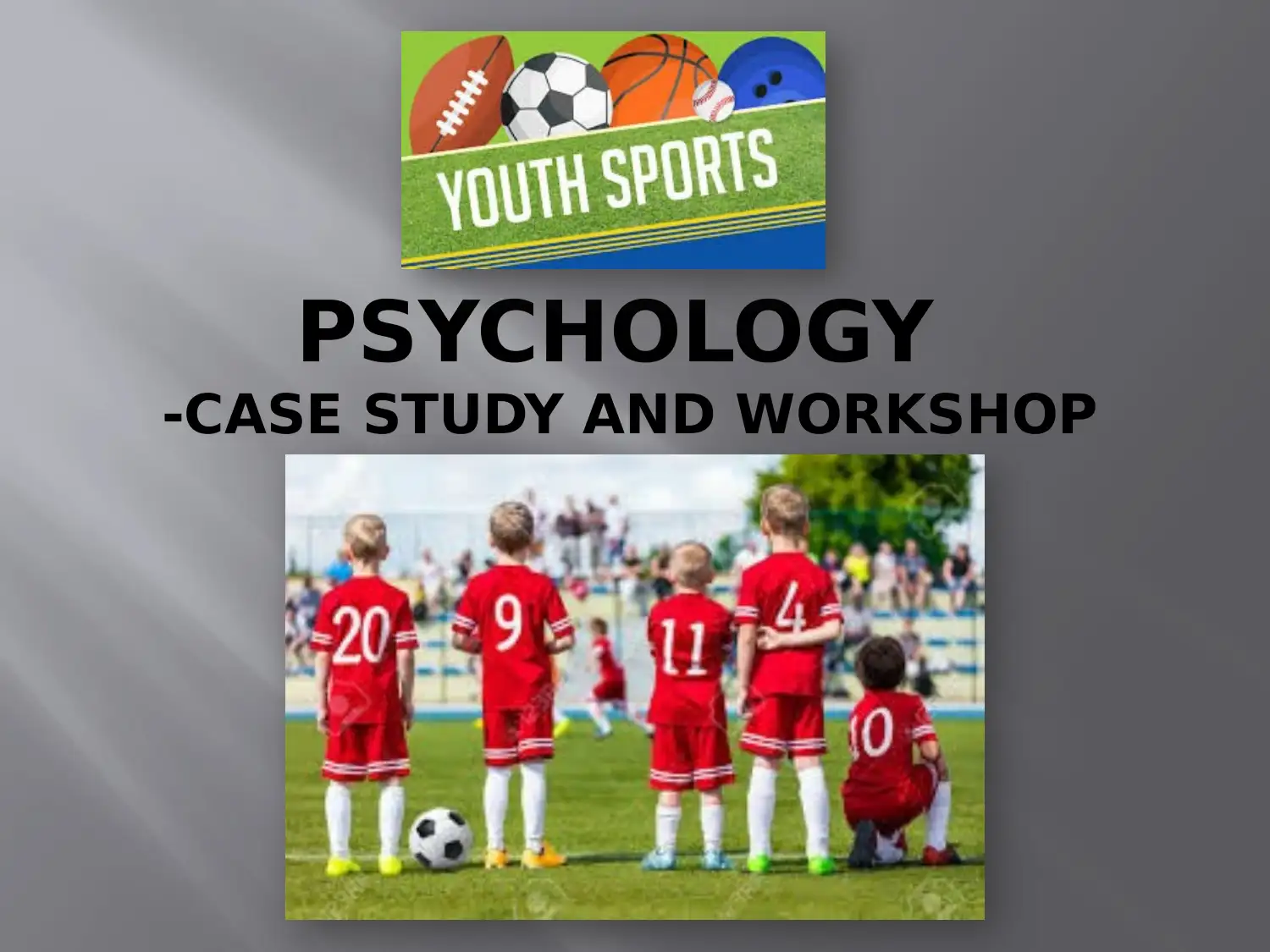
PSYCHOLOGY
-CASE STUDY AND WORKSHOP
-CASE STUDY AND WORKSHOP
Paraphrase This Document
Need a fresh take? Get an instant paraphrase of this document with our AI Paraphraser
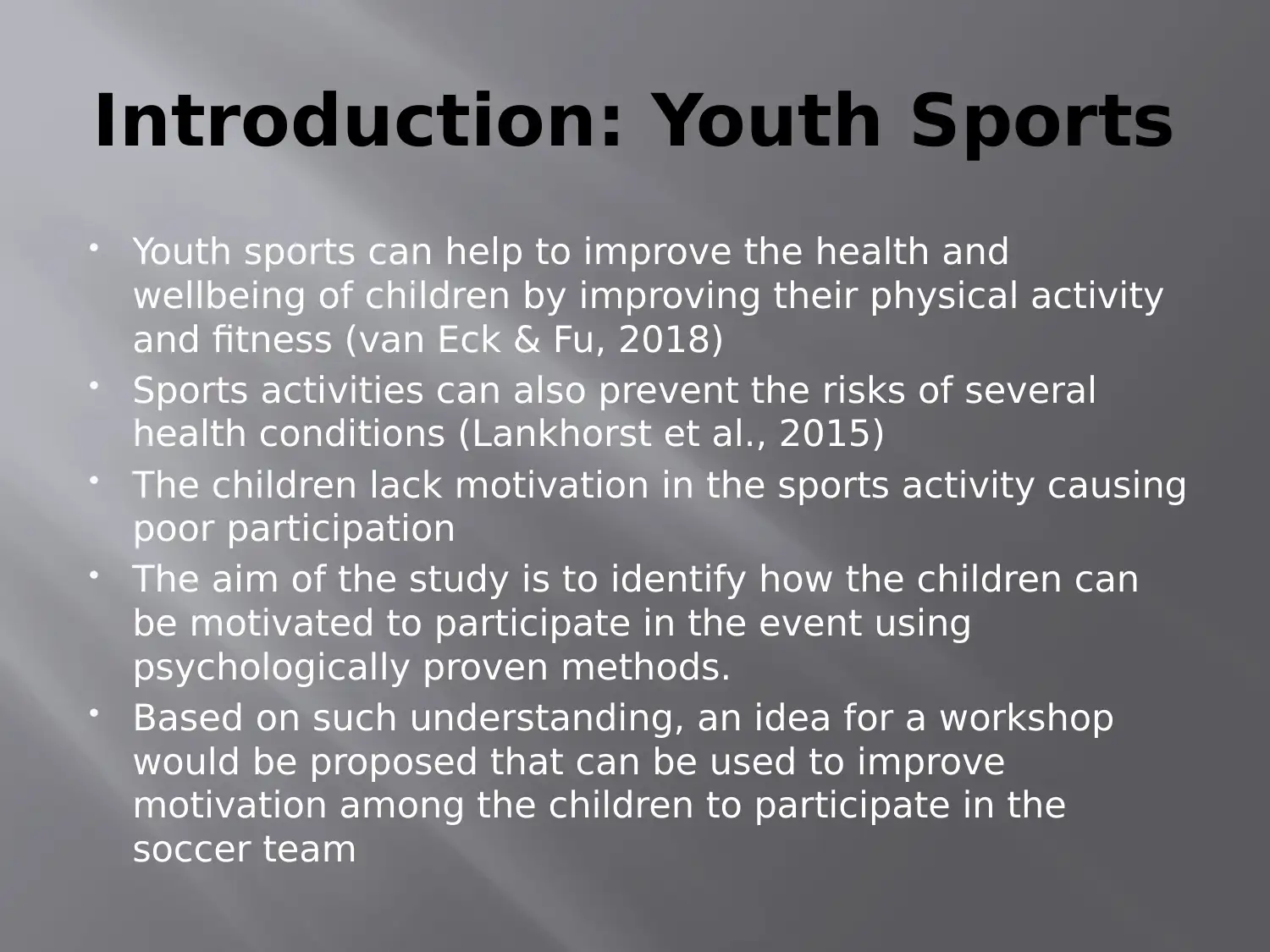
Introduction: Youth Sports
Youth sports can help to improve the health and
wellbeing of children by improving their physical activity
and fitness (van Eck & Fu, 2018)
Sports activities can also prevent the risks of several
health conditions (Lankhorst et al., 2015)
The children lack motivation in the sports activity causing
poor participation
The aim of the study is to identify how the children can
be motivated to participate in the event using
psychologically proven methods.
Based on such understanding, an idea for a workshop
would be proposed that can be used to improve
motivation among the children to participate in the
soccer team
Youth sports can help to improve the health and
wellbeing of children by improving their physical activity
and fitness (van Eck & Fu, 2018)
Sports activities can also prevent the risks of several
health conditions (Lankhorst et al., 2015)
The children lack motivation in the sports activity causing
poor participation
The aim of the study is to identify how the children can
be motivated to participate in the event using
psychologically proven methods.
Based on such understanding, an idea for a workshop
would be proposed that can be used to improve
motivation among the children to participate in the
soccer team
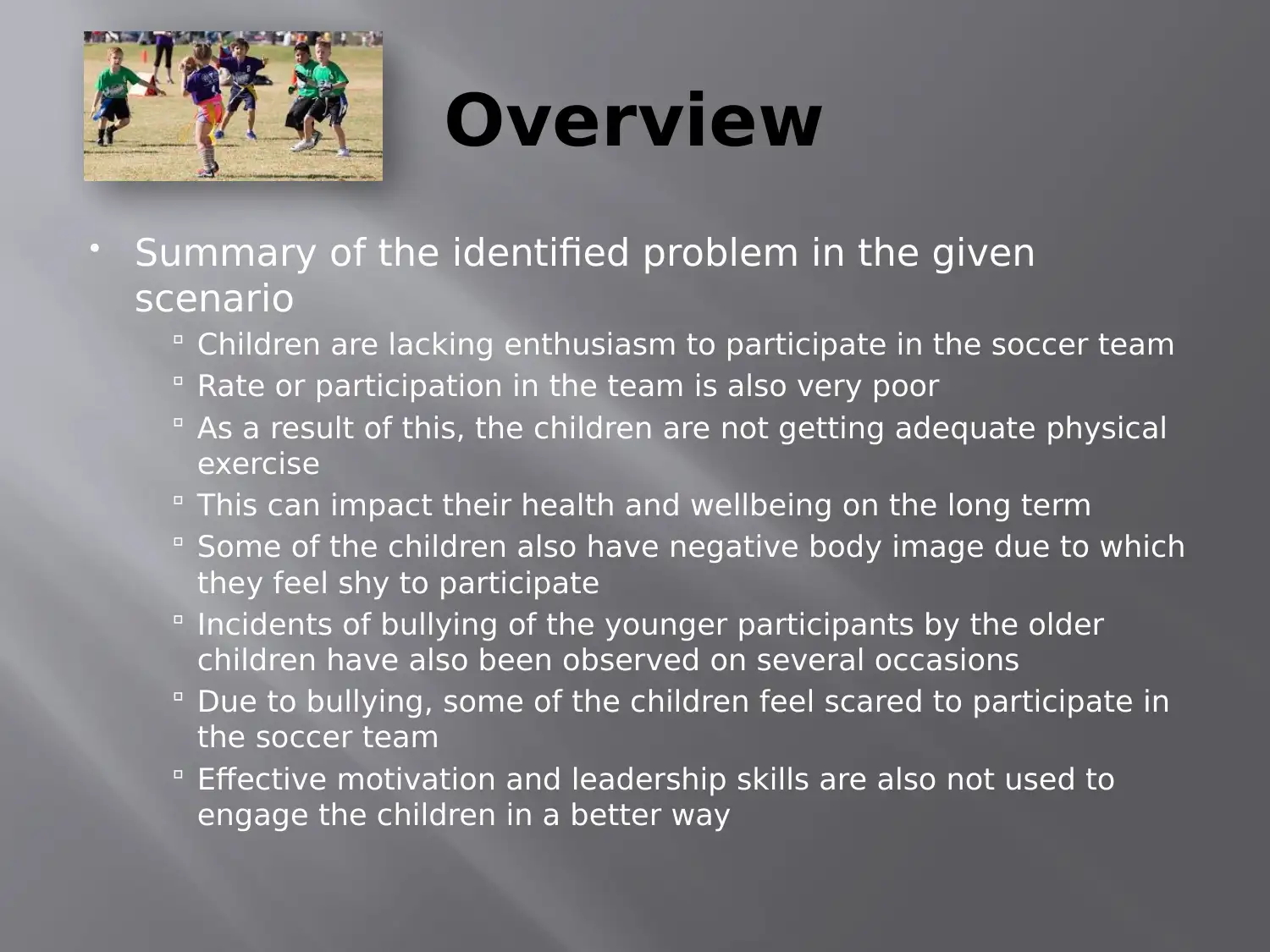
Overview
Summary of the identified problem in the given
scenario
Children are lacking enthusiasm to participate in the soccer team
Rate or participation in the team is also very poor
As a result of this, the children are not getting adequate physical
exercise
This can impact their health and wellbeing on the long term
Some of the children also have negative body image due to which
they feel shy to participate
Incidents of bullying of the younger participants by the older
children have also been observed on several occasions
Due to bullying, some of the children feel scared to participate in
the soccer team
Effective motivation and leadership skills are also not used to
engage the children in a better way
Summary of the identified problem in the given
scenario
Children are lacking enthusiasm to participate in the soccer team
Rate or participation in the team is also very poor
As a result of this, the children are not getting adequate physical
exercise
This can impact their health and wellbeing on the long term
Some of the children also have negative body image due to which
they feel shy to participate
Incidents of bullying of the younger participants by the older
children have also been observed on several occasions
Due to bullying, some of the children feel scared to participate in
the soccer team
Effective motivation and leadership skills are also not used to
engage the children in a better way
⊘ This is a preview!⊘
Do you want full access?
Subscribe today to unlock all pages.

Trusted by 1+ million students worldwide
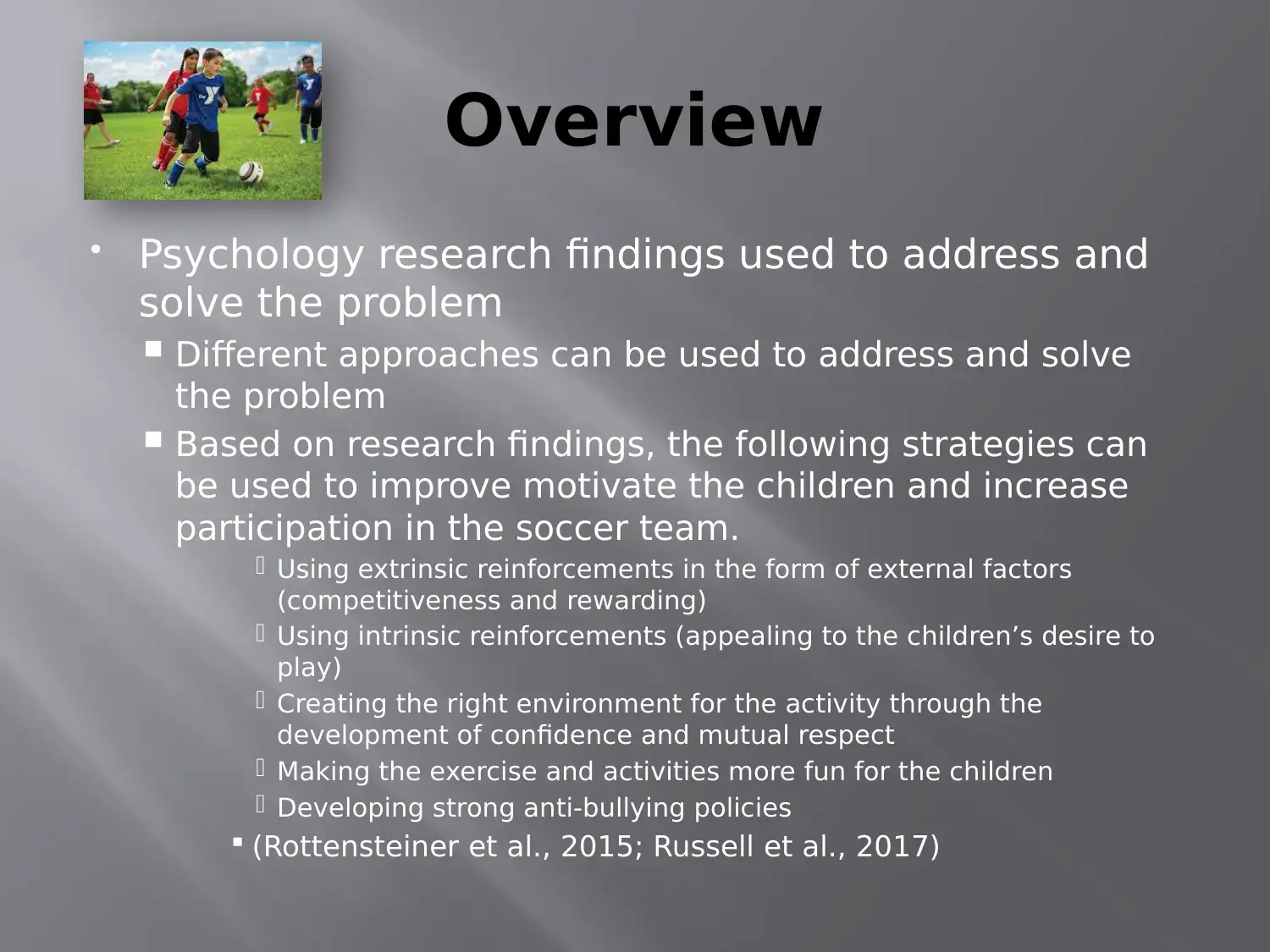
Overview
Psychology research findings used to address and
solve the problem
Different approaches can be used to address and solve
the problem
Based on research findings, the following strategies can
be used to improve motivate the children and increase
participation in the soccer team.
Using extrinsic reinforcements in the form of external factors
(competitiveness and rewarding)
Using intrinsic reinforcements (appealing to the children’s desire to
play)
Creating the right environment for the activity through the
development of confidence and mutual respect
Making the exercise and activities more fun for the children
Developing strong anti-bullying policies
(Rottensteiner et al., 2015; Russell et al., 2017)
Psychology research findings used to address and
solve the problem
Different approaches can be used to address and solve
the problem
Based on research findings, the following strategies can
be used to improve motivate the children and increase
participation in the soccer team.
Using extrinsic reinforcements in the form of external factors
(competitiveness and rewarding)
Using intrinsic reinforcements (appealing to the children’s desire to
play)
Creating the right environment for the activity through the
development of confidence and mutual respect
Making the exercise and activities more fun for the children
Developing strong anti-bullying policies
(Rottensteiner et al., 2015; Russell et al., 2017)
Paraphrase This Document
Need a fresh take? Get an instant paraphrase of this document with our AI Paraphraser
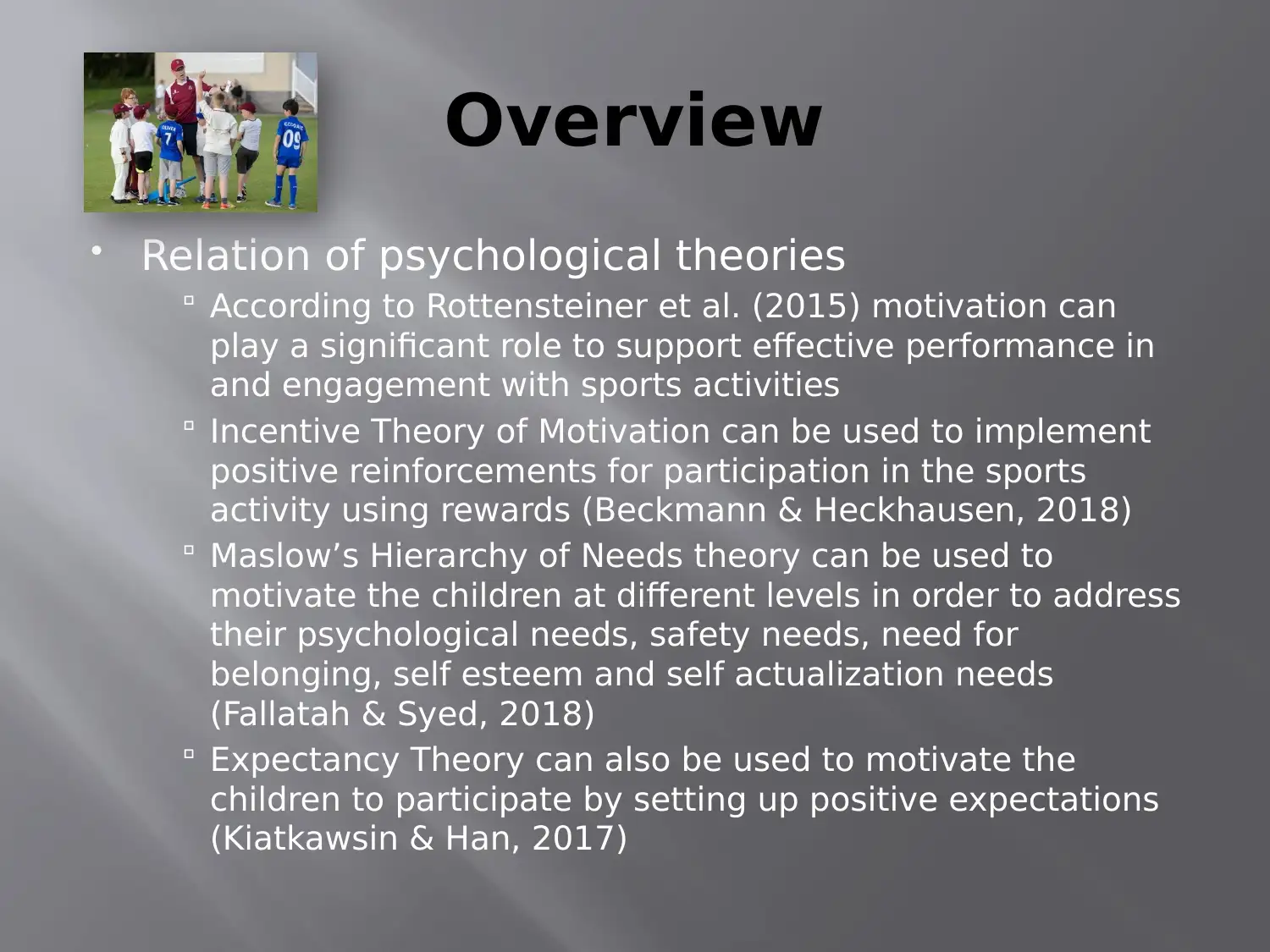
Overview
Relation of psychological theories
According to Rottensteiner et al. (2015) motivation can
play a significant role to support effective performance in
and engagement with sports activities
Incentive Theory of Motivation can be used to implement
positive reinforcements for participation in the sports
activity using rewards (Beckmann & Heckhausen, 2018)
Maslow’s Hierarchy of Needs theory can be used to
motivate the children at different levels in order to address
their psychological needs, safety needs, need for
belonging, self esteem and self actualization needs
(Fallatah & Syed, 2018)
Expectancy Theory can also be used to motivate the
children to participate by setting up positive expectations
(Kiatkawsin & Han, 2017)
Relation of psychological theories
According to Rottensteiner et al. (2015) motivation can
play a significant role to support effective performance in
and engagement with sports activities
Incentive Theory of Motivation can be used to implement
positive reinforcements for participation in the sports
activity using rewards (Beckmann & Heckhausen, 2018)
Maslow’s Hierarchy of Needs theory can be used to
motivate the children at different levels in order to address
their psychological needs, safety needs, need for
belonging, self esteem and self actualization needs
(Fallatah & Syed, 2018)
Expectancy Theory can also be used to motivate the
children to participate by setting up positive expectations
(Kiatkawsin & Han, 2017)
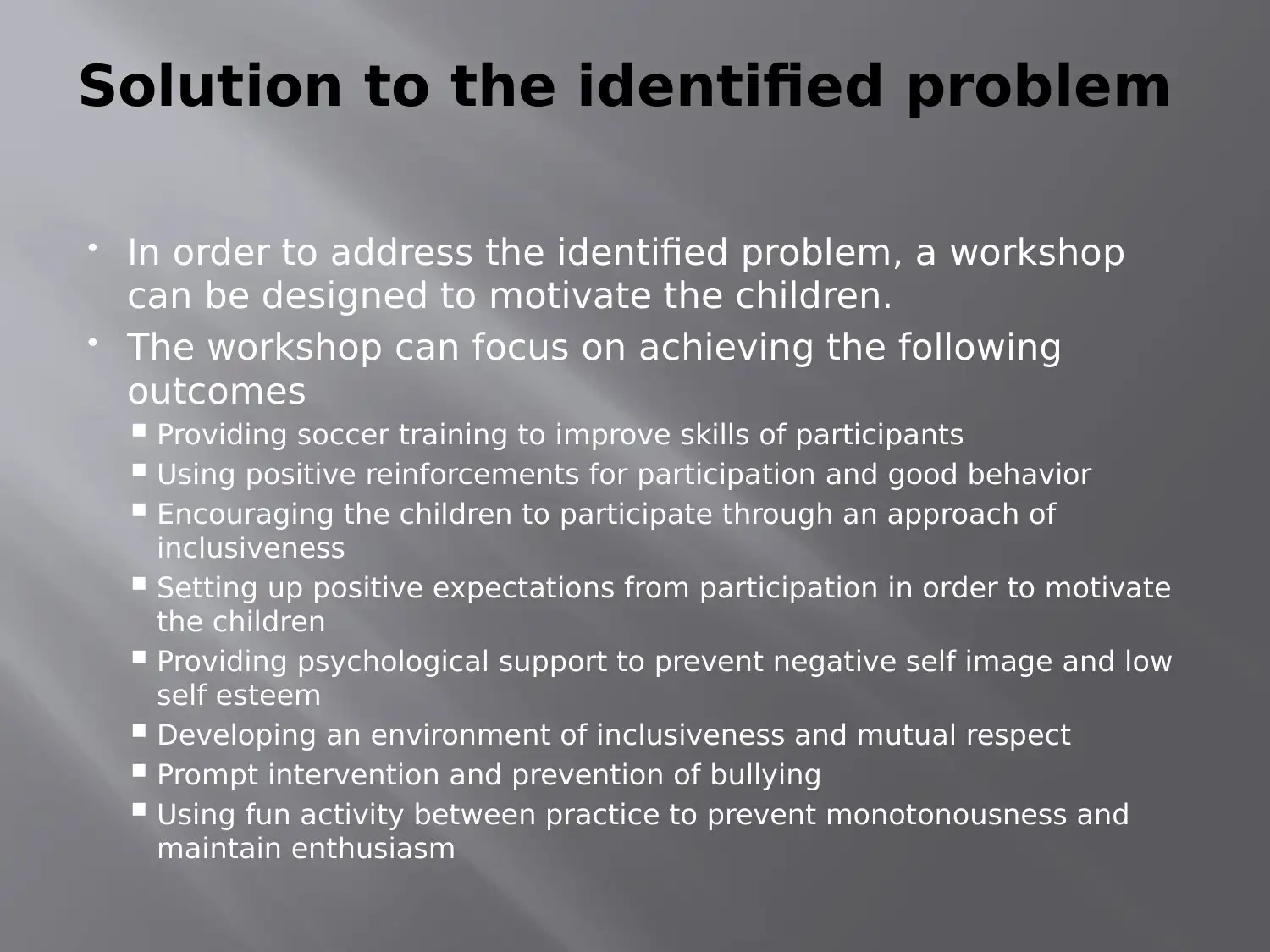
Solution to the identified problem
In order to address the identified problem, a workshop
can be designed to motivate the children.
The workshop can focus on achieving the following
outcomes
Providing soccer training to improve skills of participants
Using positive reinforcements for participation and good behavior
Encouraging the children to participate through an approach of
inclusiveness
Setting up positive expectations from participation in order to motivate
the children
Providing psychological support to prevent negative self image and low
self esteem
Developing an environment of inclusiveness and mutual respect
Prompt intervention and prevention of bullying
Using fun activity between practice to prevent monotonousness and
maintain enthusiasm
In order to address the identified problem, a workshop
can be designed to motivate the children.
The workshop can focus on achieving the following
outcomes
Providing soccer training to improve skills of participants
Using positive reinforcements for participation and good behavior
Encouraging the children to participate through an approach of
inclusiveness
Setting up positive expectations from participation in order to motivate
the children
Providing psychological support to prevent negative self image and low
self esteem
Developing an environment of inclusiveness and mutual respect
Prompt intervention and prevention of bullying
Using fun activity between practice to prevent monotonousness and
maintain enthusiasm
⊘ This is a preview!⊘
Do you want full access?
Subscribe today to unlock all pages.

Trusted by 1+ million students worldwide
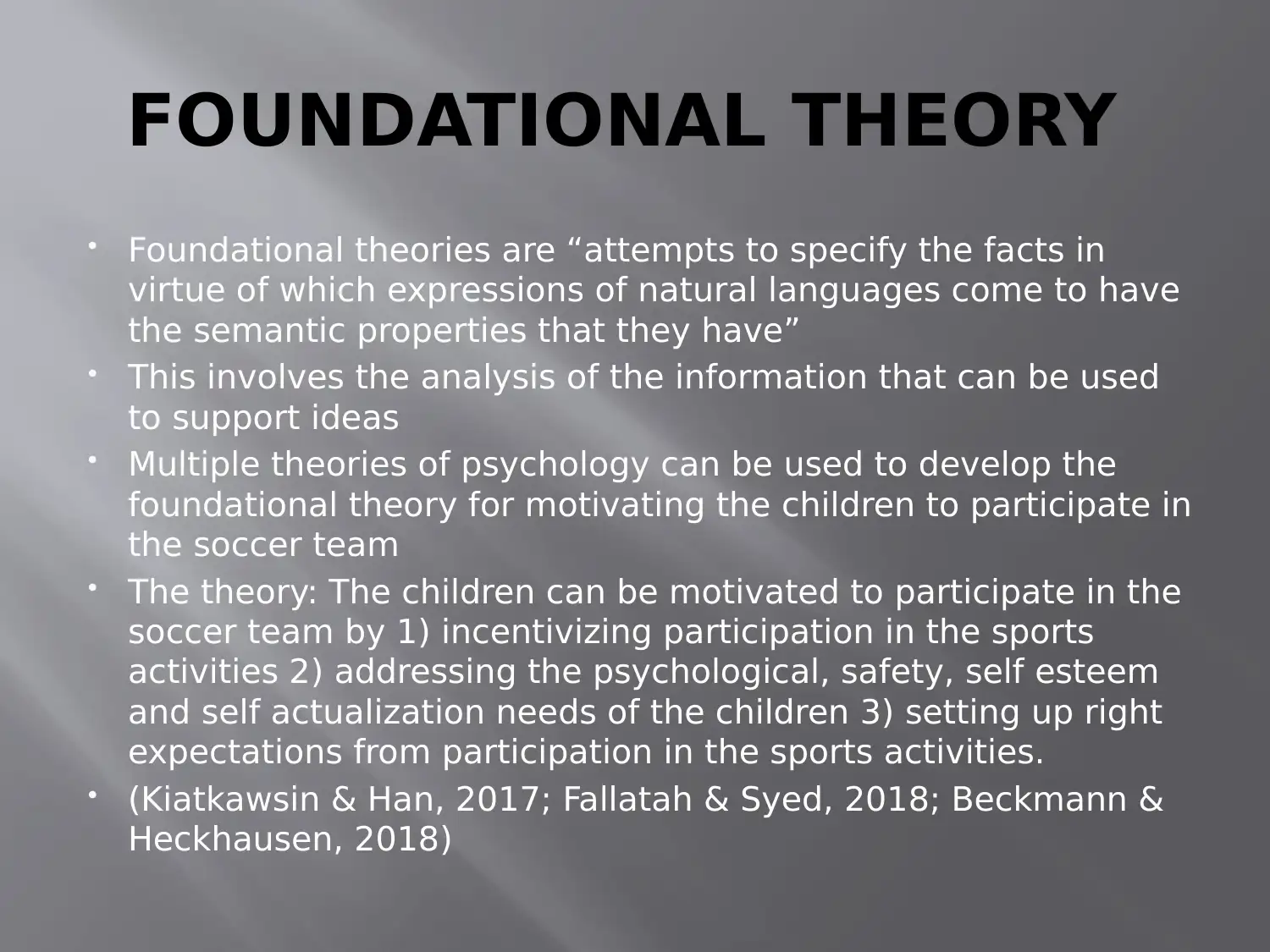
FOUNDATIONAL THEORY
Foundational theories are “attempts to specify the facts in
virtue of which expressions of natural languages come to have
the semantic properties that they have”
This involves the analysis of the information that can be used
to support ideas
Multiple theories of psychology can be used to develop the
foundational theory for motivating the children to participate in
the soccer team
The theory: The children can be motivated to participate in the
soccer team by 1) incentivizing participation in the sports
activities 2) addressing the psychological, safety, self esteem
and self actualization needs of the children 3) setting up right
expectations from participation in the sports activities.
(Kiatkawsin & Han, 2017; Fallatah & Syed, 2018; Beckmann &
Heckhausen, 2018)
Foundational theories are “attempts to specify the facts in
virtue of which expressions of natural languages come to have
the semantic properties that they have”
This involves the analysis of the information that can be used
to support ideas
Multiple theories of psychology can be used to develop the
foundational theory for motivating the children to participate in
the soccer team
The theory: The children can be motivated to participate in the
soccer team by 1) incentivizing participation in the sports
activities 2) addressing the psychological, safety, self esteem
and self actualization needs of the children 3) setting up right
expectations from participation in the sports activities.
(Kiatkawsin & Han, 2017; Fallatah & Syed, 2018; Beckmann &
Heckhausen, 2018)
Paraphrase This Document
Need a fresh take? Get an instant paraphrase of this document with our AI Paraphraser
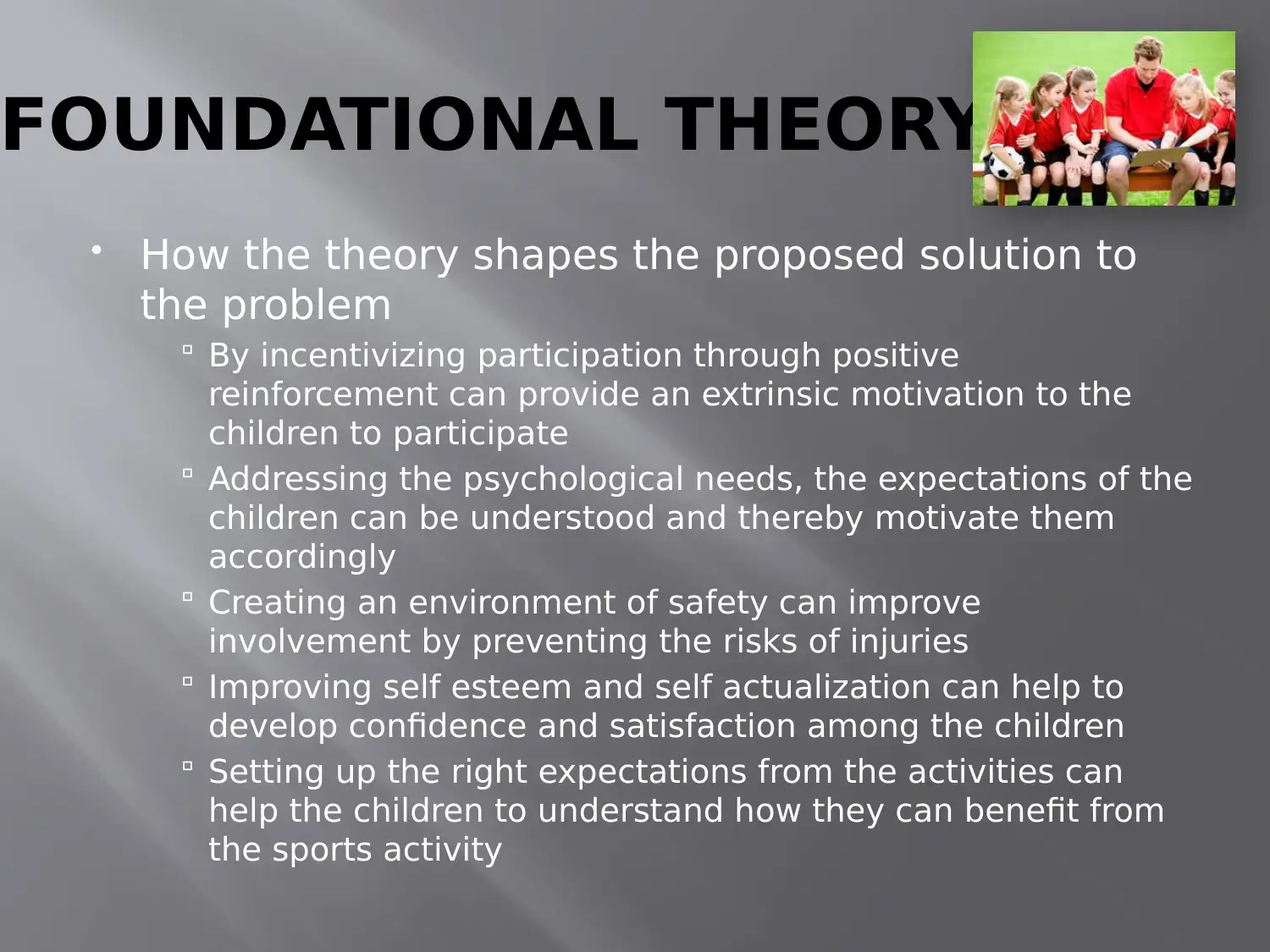
FOUNDATIONAL THEORY
How the theory shapes the proposed solution to
the problem
By incentivizing participation through positive
reinforcement can provide an extrinsic motivation to the
children to participate
Addressing the psychological needs, the expectations of the
children can be understood and thereby motivate them
accordingly
Creating an environment of safety can improve
involvement by preventing the risks of injuries
Improving self esteem and self actualization can help to
develop confidence and satisfaction among the children
Setting up the right expectations from the activities can
help the children to understand how they can benefit from
the sports activity
How the theory shapes the proposed solution to
the problem
By incentivizing participation through positive
reinforcement can provide an extrinsic motivation to the
children to participate
Addressing the psychological needs, the expectations of the
children can be understood and thereby motivate them
accordingly
Creating an environment of safety can improve
involvement by preventing the risks of injuries
Improving self esteem and self actualization can help to
develop confidence and satisfaction among the children
Setting up the right expectations from the activities can
help the children to understand how they can benefit from
the sports activity
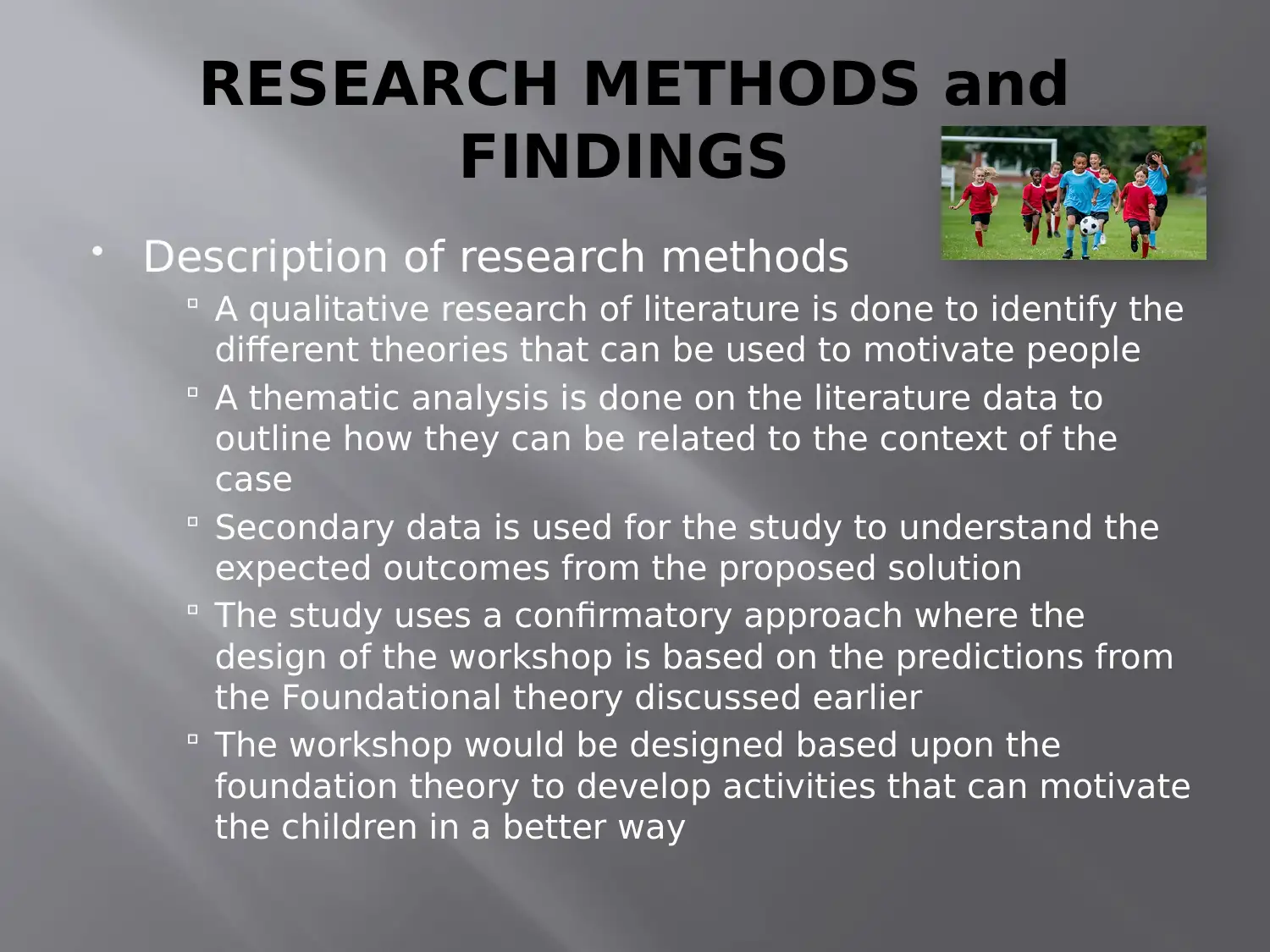
RESEARCH METHODS and
FINDINGS
Description of research methods
A qualitative research of literature is done to identify the
different theories that can be used to motivate people
A thematic analysis is done on the literature data to
outline how they can be related to the context of the
case
Secondary data is used for the study to understand the
expected outcomes from the proposed solution
The study uses a confirmatory approach where the
design of the workshop is based on the predictions from
the Foundational theory discussed earlier
The workshop would be designed based upon the
foundation theory to develop activities that can motivate
the children in a better way
FINDINGS
Description of research methods
A qualitative research of literature is done to identify the
different theories that can be used to motivate people
A thematic analysis is done on the literature data to
outline how they can be related to the context of the
case
Secondary data is used for the study to understand the
expected outcomes from the proposed solution
The study uses a confirmatory approach where the
design of the workshop is based on the predictions from
the Foundational theory discussed earlier
The workshop would be designed based upon the
foundation theory to develop activities that can motivate
the children in a better way
⊘ This is a preview!⊘
Do you want full access?
Subscribe today to unlock all pages.

Trusted by 1+ million students worldwide
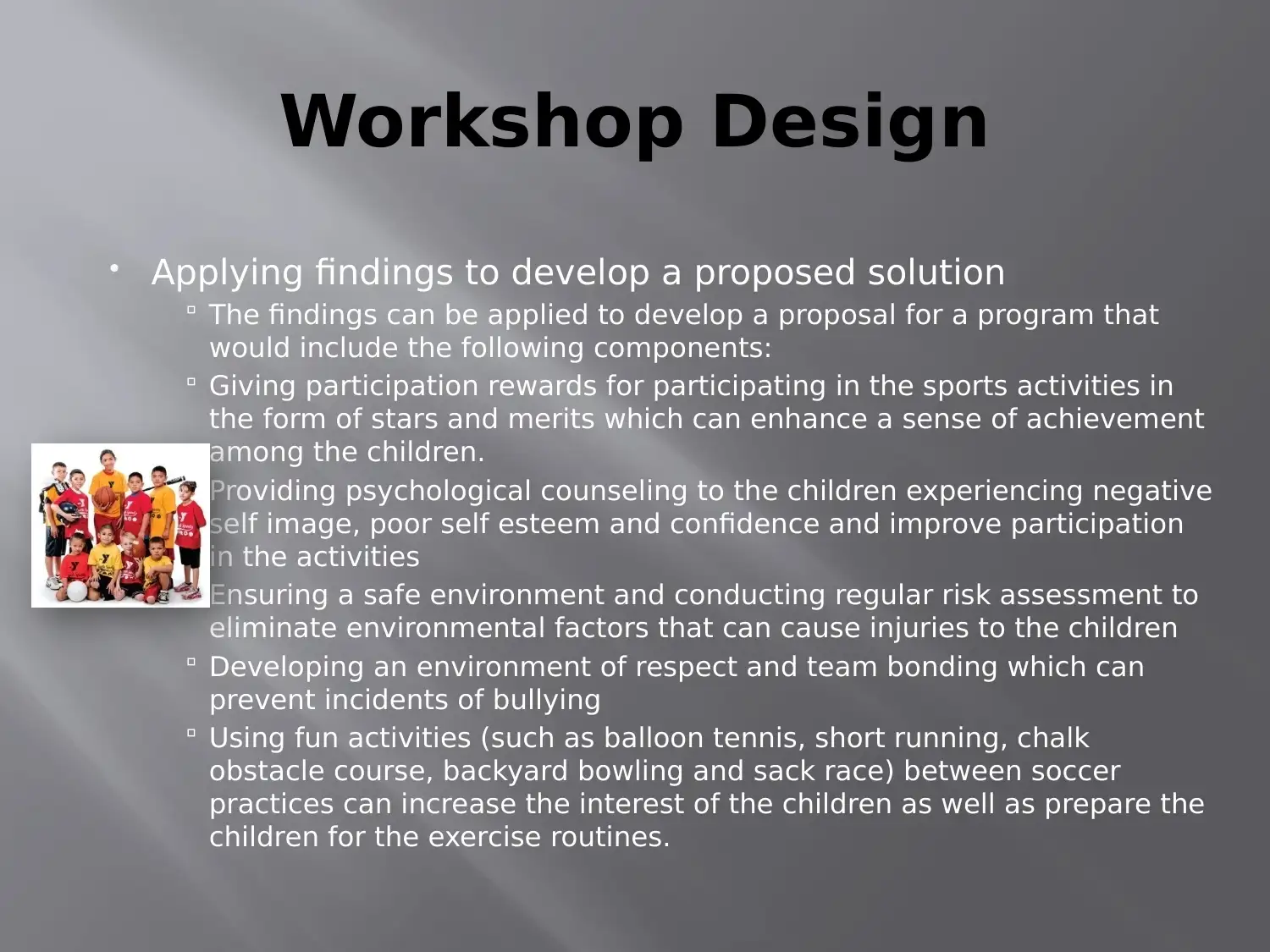
Workshop Design
Applying findings to develop a proposed solution
The findings can be applied to develop a proposal for a program that
would include the following components:
Giving participation rewards for participating in the sports activities in
the form of stars and merits which can enhance a sense of achievement
among the children.
Providing psychological counseling to the children experiencing negative
self image, poor self esteem and confidence and improve participation
in the activities
Ensuring a safe environment and conducting regular risk assessment to
eliminate environmental factors that can cause injuries to the children
Developing an environment of respect and team bonding which can
prevent incidents of bullying
Using fun activities (such as balloon tennis, short running, chalk
obstacle course, backyard bowling and sack race) between soccer
practices can increase the interest of the children as well as prepare the
children for the exercise routines.
Applying findings to develop a proposed solution
The findings can be applied to develop a proposal for a program that
would include the following components:
Giving participation rewards for participating in the sports activities in
the form of stars and merits which can enhance a sense of achievement
among the children.
Providing psychological counseling to the children experiencing negative
self image, poor self esteem and confidence and improve participation
in the activities
Ensuring a safe environment and conducting regular risk assessment to
eliminate environmental factors that can cause injuries to the children
Developing an environment of respect and team bonding which can
prevent incidents of bullying
Using fun activities (such as balloon tennis, short running, chalk
obstacle course, backyard bowling and sack race) between soccer
practices can increase the interest of the children as well as prepare the
children for the exercise routines.
Paraphrase This Document
Need a fresh take? Get an instant paraphrase of this document with our AI Paraphraser
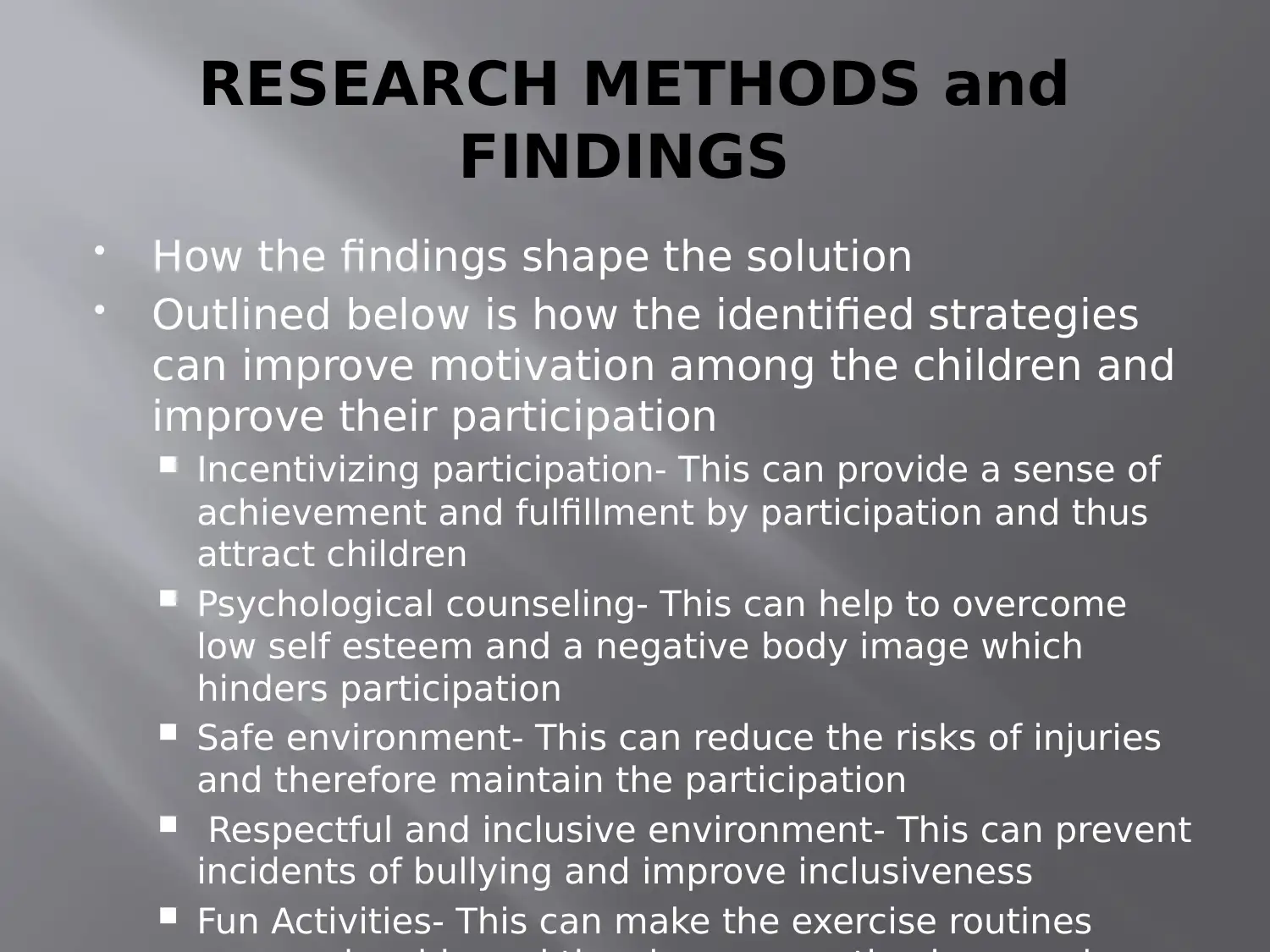
RESEARCH METHODS and
FINDINGS
How the findings shape the solution
Outlined below is how the identified strategies
can improve motivation among the children and
improve their participation
Incentivizing participation- This can provide a sense of
achievement and fulfillment by participation and thus
attract children
Psychological counseling- This can help to overcome
low self esteem and a negative body image which
hinders participation
Safe environment- This can reduce the risks of injuries
and therefore maintain the participation
Respectful and inclusive environment- This can prevent
incidents of bullying and improve inclusiveness
Fun Activities- This can make the exercise routines
FINDINGS
How the findings shape the solution
Outlined below is how the identified strategies
can improve motivation among the children and
improve their participation
Incentivizing participation- This can provide a sense of
achievement and fulfillment by participation and thus
attract children
Psychological counseling- This can help to overcome
low self esteem and a negative body image which
hinders participation
Safe environment- This can reduce the risks of injuries
and therefore maintain the participation
Respectful and inclusive environment- This can prevent
incidents of bullying and improve inclusiveness
Fun Activities- This can make the exercise routines
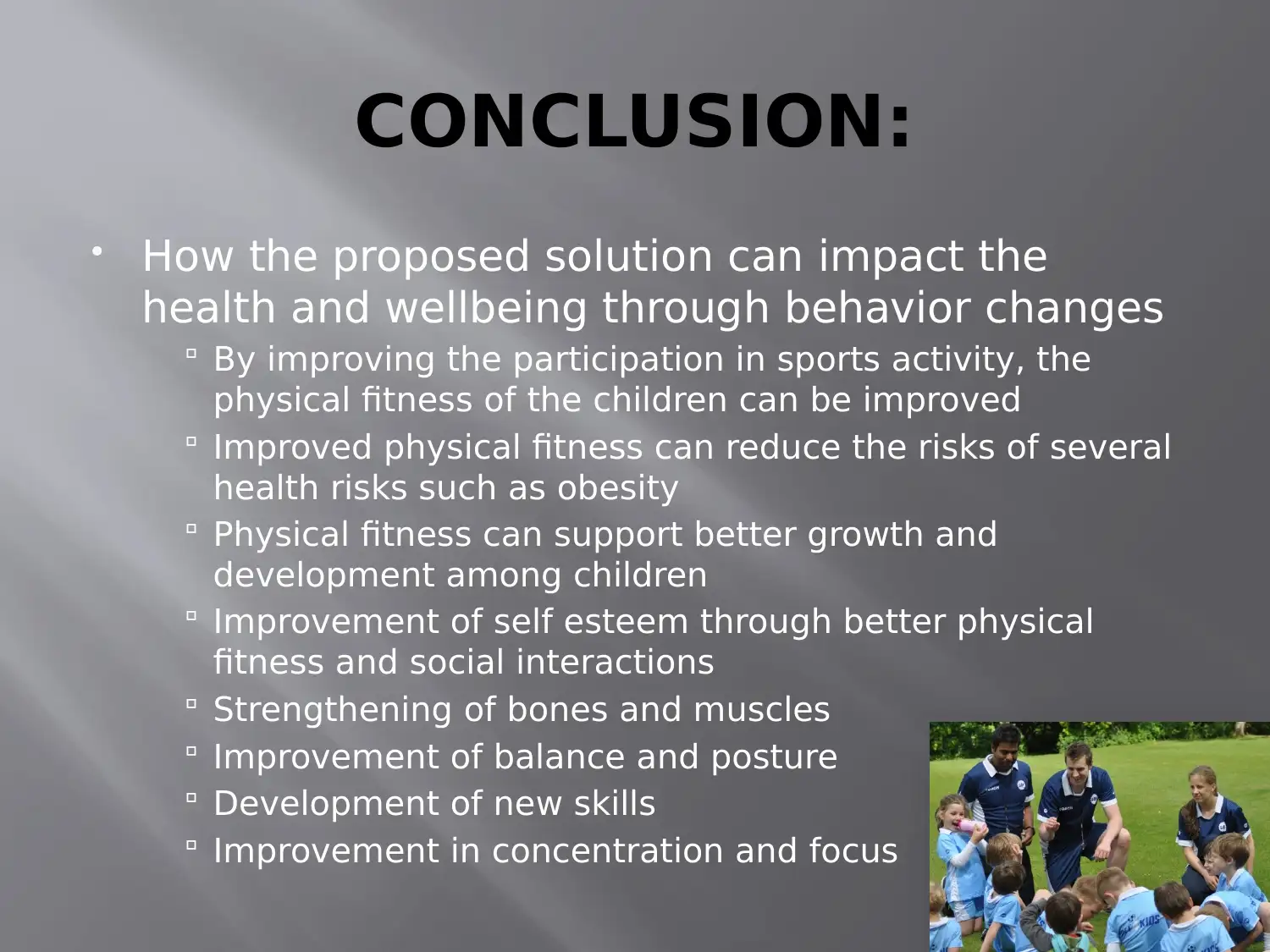
CONCLUSION:
How the proposed solution can impact the
health and wellbeing through behavior changes
By improving the participation in sports activity, the
physical fitness of the children can be improved
Improved physical fitness can reduce the risks of several
health risks such as obesity
Physical fitness can support better growth and
development among children
Improvement of self esteem through better physical
fitness and social interactions
Strengthening of bones and muscles
Improvement of balance and posture
Development of new skills
Improvement in concentration and focus
How the proposed solution can impact the
health and wellbeing through behavior changes
By improving the participation in sports activity, the
physical fitness of the children can be improved
Improved physical fitness can reduce the risks of several
health risks such as obesity
Physical fitness can support better growth and
development among children
Improvement of self esteem through better physical
fitness and social interactions
Strengthening of bones and muscles
Improvement of balance and posture
Development of new skills
Improvement in concentration and focus
⊘ This is a preview!⊘
Do you want full access?
Subscribe today to unlock all pages.

Trusted by 1+ million students worldwide
1 out of 14
Related Documents
Your All-in-One AI-Powered Toolkit for Academic Success.
+13062052269
info@desklib.com
Available 24*7 on WhatsApp / Email
![[object Object]](/_next/static/media/star-bottom.7253800d.svg)
Unlock your academic potential
Copyright © 2020–2026 A2Z Services. All Rights Reserved. Developed and managed by ZUCOL.





